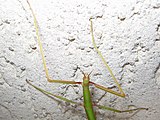Bacillus rossius
This article needs additional citations for verification. (August 2021) |
| Bacillus rossius | |
|---|---|

| |
| Scientific classification | |
| Domain: | Eukaryota |
| Kingdom: | Animalia |
| Phylum: | Arthropoda |
| Class: | Insecta |
| Order: | Phasmatodea |
| Family: | Bacillidae |
| Genus: | Bacillus |
| Species: | B. rossius
|
| Binomial name | |
| Bacillus rossius (Rossi, 1790)
| |
| Subspecies[1] | |
| |
| Synonyms[1] | |
| |
The European stick insect (Bacillus rossius) also called the European stick bug, European walking stick, or Mediterranean stick insect, is a species of stick insect, common in southern Europe. The species is endemic to the northwestern Mediterranean, especially Italy, Spain, Southern France, and the Balkans.[2][3]
Overview
[edit]Adults have a slim body, with short antennae and long, thin legs. Colors vary from brown to green, sometimes with a pinkish tinge on its head, legs and sides. This species can eat bramble leaves, ivy, and privet. B. rossius can be found from June to mid December and the eggs look like seeds. Females are larger than the male, with a bigger abdomen. An adult can be 10 cm (4 inches) in length.
Life cycle
[edit]The nymphs hatch out from their seed-like eggs 8 weeks to 2 months after being laid by a female. like the adult, the nymphs sway as in a breeze to avoid predators. B. rossius lives up to a year. They are nocturnal and may stay still for hours and usually feed at night. They shed the exoskeleton a few times in their life.
Predators
[edit]The predators include birds, frogs, lizards, rodents and spiders.
Gallery
[edit]-
Many young stick insects on leaves (video)
-
A brown form
-
B. rossius on a twig
-
A green form
-
Video of a European stick insect (B. rossius)
-
Eating a leaf of Rubus ulmifolius (mouthparts also visible)
-
Adult and nymph
-
Female stick insect
-
Female (head's detail)
-
A stick bug
See also
[edit]- Bacillus atticus atticus, the endemic Bacillus of Greece
References
[edit]- ^ a b "Bacillus rossius". Global Biodiversity Information Facility. Retrieved 28 August 2021.
- ^ Oliver Zompro: Grundwissen Pasmiden – Biologie - Haltung - Zucht. Sungaya Verlag, Berlin 2012, S. 73, ISBN 978-3-943592-00-9
- ^ "Bacillus rossius at bugsincyberspace.com". Archived from the original on 2007-11-27. Retrieved 2007-11-18.
External links
[edit]![]() Media related to Bacillus rossius at Wikimedia Commons
Media related to Bacillus rossius at Wikimedia Commons







